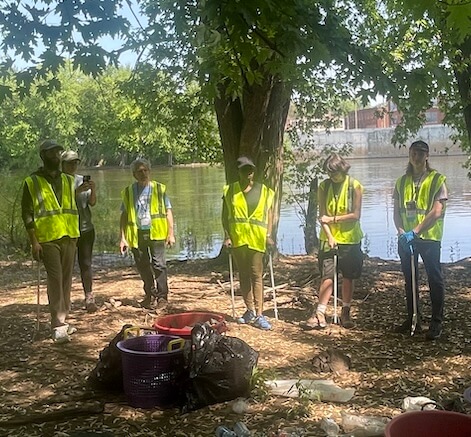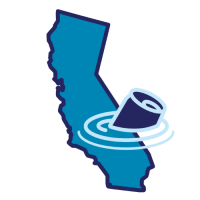State Policy Approaches to Address Aquatic Litter: Extended Producer Responsibility for Packaging
What’s the Issue?
Litter significantly impacts the environment and communities, with around 50 billion pieces found along US roadways and waterways, equating to 152 pieces per US resident. It damages aquatic habitats, disrupts food webs, and harms wildlife through entanglement or ingestion. Litter buildup can cause flooding by clogging drains, spreading diseases, and attracting unwanted wildlife, resulting in significant economic costs and an estimated $11.5 billion annual cleanup expense in the US.
Despite the US Environmental Protection Agency (EPA)’s involvement, there is no comprehensive federal oversight on litter prevention. For decades, recycle programs have been local and funded at a base level to provide basic day-to-day services like collection, processing and marketing. Strategic planning, innovation, program education and outreach and developing local and regional markets for collected recyclables have not been focal points over the years. Instead the US became heavily reliant on China and other countries like Malaysia to purchase lower quality recyclable materials from the US until 2018.
In 2018, China implemented its “Operation National Sword” policy and announced it would no longer be taking any US recyclables by the end of 2019. As a result, recyclables piled up in some locations in the US, and some communities renegotiated contracts with processors, paid more for processing recyclables, reduced the items collected for recycling, or even stopped providing recycling services altogether. This spurred some states to develop Extended Producer Responsibility (EPR) policies to implement programs creating state recycling markets, and in some states, reduce packaging altogether.
The policies featured in the Hub vary in how explicitly they target aquatic litter concerns or directly funnel resources towards recycling and trash waste reduction in waterways. Explore the deep dives of Oregon and Washington’s policies and implementation efforts for more.
Examples of State Policy
- Colorado: The Producer Responsibility Program for Statewide Recycling Act passed into law in 2022, requires packing producers to pay annual dues to fund a designated nonprofit organization to manage a statewide recycling program to service residences, public places, small businesses, schools, and government buildings.
- Oregon: The Plastic Pollution and Recycling Modernization Act passed into law in 2021, holds producers of packaging and products accountable for product lifecycle management, enhances recycling, educates the public on litter impacts, restricts single-use plastics, and funds clean-up efforts in waterways and coastal areas.
Additional Resources
- Product Stewardship Institute website includes many useful EPR resources, including a map of states with packaging EPR laws.
- National Caucus of Environmental Legislators’ Extended Producer Responsibility (EPR) issue area page is an excellent resource, and includes:
- a digestible fact sheet
- a 2024 blog post highlighting that more than 115 bills were introduced across states to address plastic pollution and zero waste goals.
- Extended Producer Responsibility report (2023)
- WWF’s EPR factsheet includes a helpful breakdown of stakeholder roles and responsibilities
- The Recycling Partnership’s website includes recent data on community recycling program acceptance across the US.
- A Recycling Reckoning: How Operation National Sword catalyzed a transition in the U.S. plastics recycling system (2022) ScienceDirect, Jessica Heige and Kate O’Neill
- River Network’s Waste in Our Waters: A Community Toolkit for Aquatic Litter Removal is a step-by-step guide for addressing litter in your community, both before and after it reached your local waterway.
- (435) Recycling Modernization Act – YouTube
- Oregon Department of Environmental Quality’s factsheet about the Act: Plastic Pollution and Recycling Modernization Act
- Ocean Conservancy:
- Factsheet: California Senate Bill 54: Tackling Plastic Pollution at the Source
- EPR model legislation: Model Pollution Prevention and Producer Responsibility Act (2024)
- EPR Toolkit: Tackling Plastic Pollution Through Producer Accountability (2025)
Development of the State Policy Approaches to Aquatic Litter: Extended Producer Responsibility State Policy Hub category was led by
Kristy Meyer, Upriver Consulting.
State Policy to Address Aquatic Litter: EPR Policy Database
| Name | State | Action Agency | Policy Focus | Description |
|---|---|---|---|---|
| Plastic Pollution and Recycling Modernization Act (Senate Bill 582) | Oregon | Oregon Department of Environmental Quality | The legislation develops a program to reduce aquatic litter by holding producers of packaging and products accountable for product lifecycle management, enhancing recycling, educating the public on litter impacts, restricting single-use plastics, and funding clean-up efforts in waterways and coastal areas. |
|
| An Act To Support and Improve Municipal Recycling Programs and Save Taxpayer Money (Legislative Document 1541, H.P. 1146) | Maine | Maine Department of Environmental Protection | The legislation establishes a stewardship program where producers pay into a fund based on packaging material weight. They can offset payments by implementing independent recycling programs. The stewardship organization uses these payments to reimburse municipalities and improve recycling outcomes. |
|
| Plastic Pollution Prevention and Packaging Producer Responsibility Act (Senate Bill 54) | California | CalRecycle | The legislation aims to reduce single-use plastics by 25% by 2032, with 10% through elimination and 4% via reuse systems. The law establishes interim targets and ensures recyclability or compostability of all packaging by 2032, resulting in 115 million tons less CO₂-equivalent emissions over the next decade. |
|
| Producer Responsibility Program for Statewide Recycling Act (House Bill 22-1355) | Colorado | Colorado Department of Public Health & Environment | The legislation requires packing producers to pay annual dues to fund a designated nonprofit organization to manage a statewide recycling program which will serve residences, public places, small businesses, schools, and government buildings. |
|
| Packaging Waste and Cost Reduction Act (House Files 3911 Article 5) | Minnesota | Minnesota Pollution Control Agency | Article 5 of H.F. 3911 establishes increased penalties for littering, promoting public awareness campaigns, and supporting local government efforts in waste management and cleanup. It emphasizes community involvement and education to foster responsible waste disposal practices, which collectively contribute to a reduction in littering and environmental pollution. By 2032, "the commissioner of the Pollution Control Agency, in consultation with the commissioners of health and natural resources, must contract with a third party that is not a producer or a producer responsibility organization to conduct a study to identify the contribution of covered products to litter and water pollution in Minnesota." |







